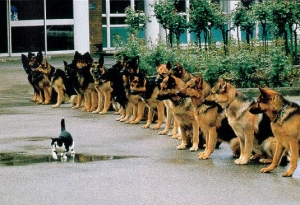
in some realms such as religion and politics, we will go to great lengths to achieve this sort of assimilation—and we’re strongly urged to. To question certain tenets, once we’ve adopted them, is to become a heretic—no matter what new data we may encounter. Unfortunately, we frequently do the same thing in business. Every industry, field or sector has its conventional wisdom, its set of beliefs about what customers want, how to be competitive and what makes a business successful. These assumptions can become such strong filters that we don’t even consider revising them because they blind us to the very data that might prompt us to change our thinking.
Noted Educational Psychologist Jean Piaget observed that students, in particular young children, acquire new information in two distinct ways. One way is to assimilate that information into the mental framework or schema the child already has. The other is to change the child’s mental framework in order to accommodate the new information. A common illustration is the child who learns to identify a “doggie.” The child may learn to assimilate all sorts of different dogs, from a stout Dachshund, to a furry Collie to a massive Great Dane, into this mental schema. Then the child encounters a cat and at first calls it a “doggie,” but then leans that it’s not. So the child adjusts her mental schema to accommodate this new definition of what is a doggie and what isn’t, achieving a new and more sophisticated understanding.
Business examples of “doggies” are everywhere. The original consultants brought in to evaluate Xerox technology concluded that it could not be profitable because customers would not pay the high cost of the machines. What they failed to see was the alternative—and very lucrative—business model of charging by the copy. IBM failed to recognize the value of software independent of the computers it ran on. So it allowed Microsoft to license its operating system to other vendors, instead of insisting on a piece of that emerging high value sector. And then there’s the venture capitalist who saw no need for yet another search engine and took a pass on Google.
Piaget observed that students who prefer to assimilate information without changing their schema may become rigid in their thinking and resistant to ideas that don’t “fit.” They often struggle to grasp new concepts. Whereas, students who are willing to make mental adjustments to accommodate new ideas also get better at assimilating information. They learn more readily because they become skilled at systematically revising their own thinking in ways that allow them to both accommodate and assimilate more data..
To be innovators, we need to resist the urge to just assimilate new ideas into our existing thinking. Rather, we need to be willing to let go of those orthodoxies—even challenge them. As we do that, we not only become more open to new possibilities, we reshape our mindset in ways that predispose us to discover new approaches and solutions…as a sustained personal competency. The more we learn to accommodate, the more skilled we become at rethinking our thinking, which is arguably the most important innovation skill we can have.
This is one of the hardest things about innovation for many business people to grasp. Innovation is different from other business competencies because it’s not about extending our expertise; it’s about repeatedly revising our expertise, at times rethinking our most fundamental assumptions and beliefs about our business. Given how thoroughly most of us have been conditioned to rely on prior knowledge, this usually requires a deliberate shift in our thinking. In other words, if we’re not being deliberate about it, we’re probably not doing it.
As innovators, we need to be skilled accommodators, not just assimilators. We need to recognize that when we encounter new information and observations, we must constantly check to be sure that when we see a cat we don’t assume that it’s just another doggie.
Get the new Special Report, Innovation Essentials: The Four Greatest Ways We stop Ourselves…In Business and in Life. Download a free copy at: http://www.insightfusion.com/SpecialReport.asp

Leave A Comment